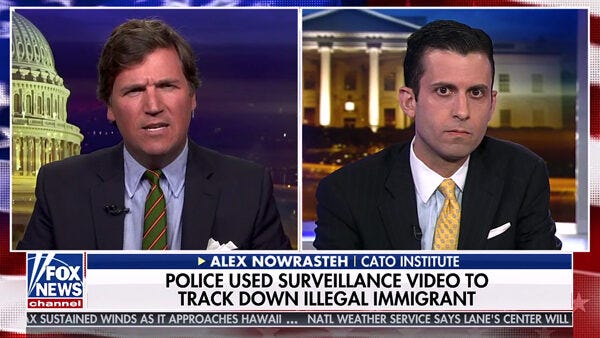There was a time when people were attracted to libertarianism because of its intellectual honesty.
This was particularly true for a kind of bright young person who enjoyed being a contrarian.
Libertarianism kept explaining the world, its problems, and best solutions, in a way that completely overturned the received opinion one found offered at NBC, NPR, CBS, PBS, ABC.
It turned out that the reason so many things kept getting worse or only slowly got better - literacy rates, poverty, racial segregation, unemployment - was because the things being offered as solutions, usually interventionist government policies, were in fact causing the problems, or intrinsically tied to the causes of the problems.
Generations of young economists were attracted by the eye opening new paradigm, as well as a few people in other fields - historians, anthropologists, psychologists.
Recently libertarians have lost this allure. They have become numerous and well-funded enough to develop their own consultant class, flaks who are paid to produce the correct conclusions, and who do so by producing the kind of fallacious arguments and by ignoring inconvenient data just like the statist academics and journalists they had so successfully dismembered a few decades ago.
Though the lowering of standards of intellectual honesty among libertarians may be occuring in several areas, the leading one seems to me to involve wanting to reach the catechismal open borders position on immigration policy. And the main offenders are the CATO Institute and its chief immigration policy analyst Alex Nowrasteh.
I know Alex personally, a little. I met him when he was a recent college grad, I believe an intern at the Competitive Enterprise Institute, before he went off to get a master’s degree from the London School of Economics. We were completely cordial at the time.
Years later I wrote an article for The Federalist, critical of open borders libertarianism, amplifying Milton Friedman’s argument that you cannot have both open borders and a welfare state, because all the poor people of the world will move to your country and exploit your taxpayers by claiming welfare benefits. I pointed out that in America’s 19th century free immigration, children worked and were not yet mandated a taxpayer funded education, and immigrants had far fewer welfare benefits. I pointed out that saying government re-direction of capital into “investments” in the education of unskilled immigrants was acceptable because it would produce more taxes from their presumably higher future earnings was a VERY weird argument for libertarians to be making.
I ran into Mr. Nowrasteh at some libertarian event in Washington, D.C., around the time he had what I took to be an embarrassing appearance on Tucker Carlson Tonight, where he seemed unable to defend CATO’s position. He came over to me and made some remark about how I like to “write cute little articles” and said I simply didn’t understand economics. (I studied economics at the University of Chicago, where my undergraduate teachers included Donald McCloskey, now Dierdre McCloskey, who has just become a senior fellow at…The CATO Institute.) Several young men I believe were Mr. Nowrasteh’s friends or fans on Facebook dragged me with a number of unkind, speculative, personal remarks.
Nowrasteh is not alone in pushing open borders, not just for an ideal libertarian society, but for the U.S. right now. Recently this advocacy is tied to a need to criticize Donald Trump’s policies. Libertarian “Never Trumpism” had become so deranged, usually among people in the consultant class whose job prospects (in their minds) depend on fitting in with “liberal” mainstream media and think tanks. The libertarian podcast The Fifth Column became a self-parody during the Trump presidency as journalist Michael Moynihan (usually insightful) predicted the complete collapse, prosecution, and imprisonment of Donald Trump within two weeks in almost every episode of the show for years. (I was a VERY loyal listener 2016-2018.) Bloomberg columnist Shika Sood Dalmia, also a writer for the libertarian Reason Foundation and for reason magazine is rumored to have been asked to leave when she began to offend reason’s donors by claiming anyone who disagreed with her about Trump and immigration was a racist. She’s now decamped to a sinecure at a free market institute at George Mason University where she covers “multiculturalism” and edits a libertarian NeverTrumper substack The UnPopulist.
While these other open borders members of the libertarian consultant and media classes beat the possibly dead horse of Donald Trump, Alex Nowrasteh has a new policy paper out at CATO just this January. It fails to correct any of the problems of his previous studies.
Immigrant and Native Consumption of Means‐Tested Welfare and Entitlement Benefits in 2020, like earlier CATO immigration studies, won’t change minds. One wonders if Nowrasteh could come to the same policy conclusions if the analysis were conceptually sounder? If so, CATO might want to do their accounting in a way that doesn't lead critics to just dismiss them as flaks. It's a sad situation since intellectual honesty is what attracted so many people to libertarianism originally.
Two problems without even going deep:
1) Public school budgets are not considered "welfare" by CATO and are not accounted for. But many low skilled, low income immigrants who come to the US bring children with them or quickly have children here, and can only work if they utilize public schools as day care. Every child they put in the school costs American taxpayers $15,000 annually, on average, and more like $30,000 in some urban areas. 26% of US public school children are immigrants or children of immigrants. (One could have relatively open immigration of course, where you simply only let in people who would support themselves and their families, and perhaps people past child bearing age.)
2) CATO announces that it does not count payments to the American born children of immigrants as welfare expenditures by immigrants but instead as welfare expenditures by Americans:
"Other studies evaluating immigrant welfare participation and consumption use the household as the unit of analysis for all programs. However, we dispute this approach because many spouses and children of immigrants are native‐born Americans. Counting native‐born welfare consumption as immigrant consumption improperly inflates estimates of immigrant welfare use and deflates native‐born consumption. "
So in a CATO analysis, if millions of people who cannot support a family move to the U.S., have many babies, and are dependent on American taxpayers for support, this is not a cost of open border policies.
To everyone CATO wants to persuade this seems dishonest and silly. They just write CATO (and libertarians generally) off and stop listening. And the danger is they will then discount CATO research and publications (and libertarian solutions) in all other areas.
If you’d like to hear further discussion of this article, check out the The Pete Quinones Show podcast in late February, where we will discuss this topic. UPDATE: As far as I know, Pete never streamed his interview with me. Either I wasn’t that interesting…or I said something that offended him, perhaps a disagreement about Zionism.
A version of this article was published earlier this week at SpliceToday.









My political origin story is libertarian. I was required by a high-school economics/civics teacher to attend a meeting of a local political party, so I picked the Libertarians, as did most of my friend group who were outsider types. I've always felt like an outsider, the Libertarians seemed more skeptical of institutions and willing to consider alternatives to the status quo. It was kind of a perfect pairing for me. But I think what has happened with big-L Libertarianism is that it took money from lowercase-u uniparty groups that oppose Trump and other uncontrollable outside politicians of consequence.
I think in particular, because libertarianism is so unpopular, which is also why I loved it so much, is that they especially oppose any kind of political populism, which explains their recent leftward bent. Leftwing populism in America died with Bernie 2016 but its survivors are mostly people who support establishment/uniparty Democrats. I looked at UnPopulist's writings about the recent constitutional crisis in Texas and concluded this person is a Federalist, someone who trusts the big State and not the states. This is not in alignment with my understanding of libertarianism, and a major sign of how financial incentives inevitably shape viewpoints for the commentariat.
I have always said that libertarians are just Democrat lite.